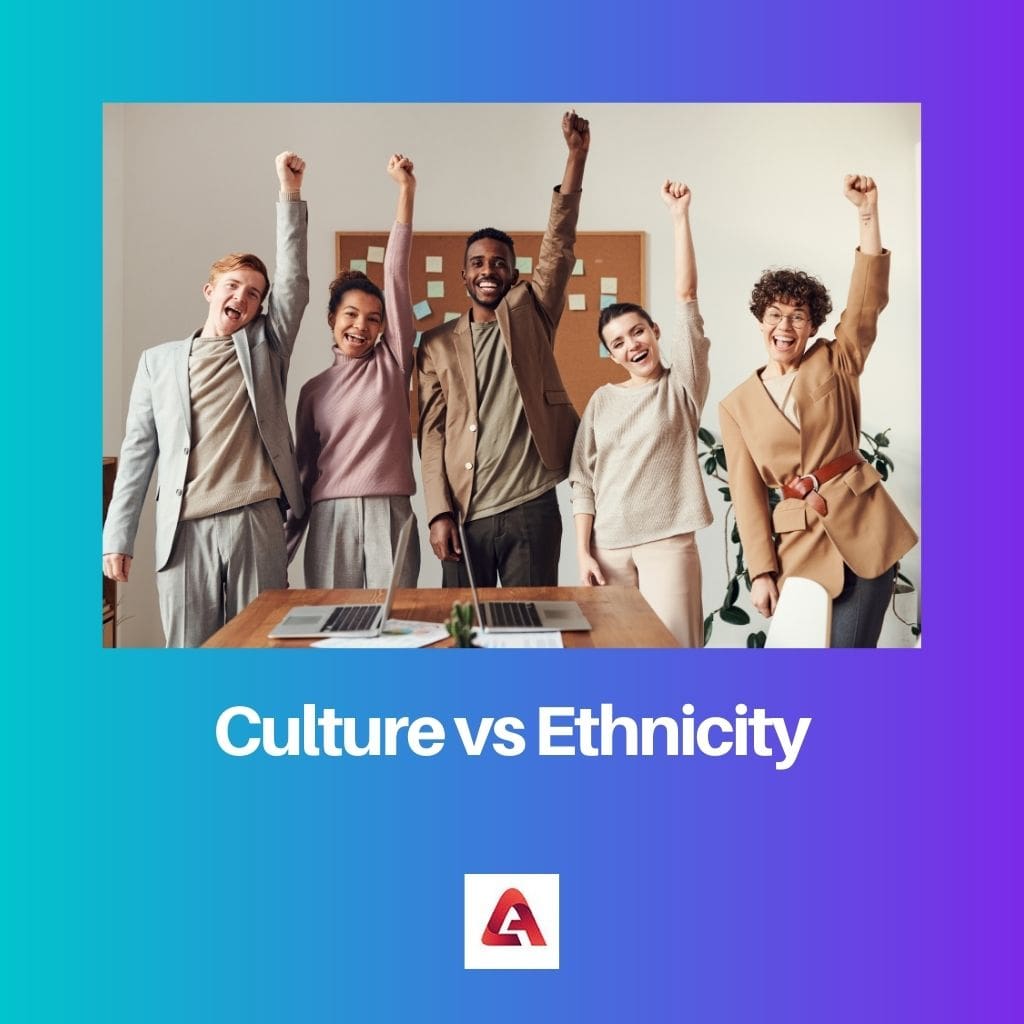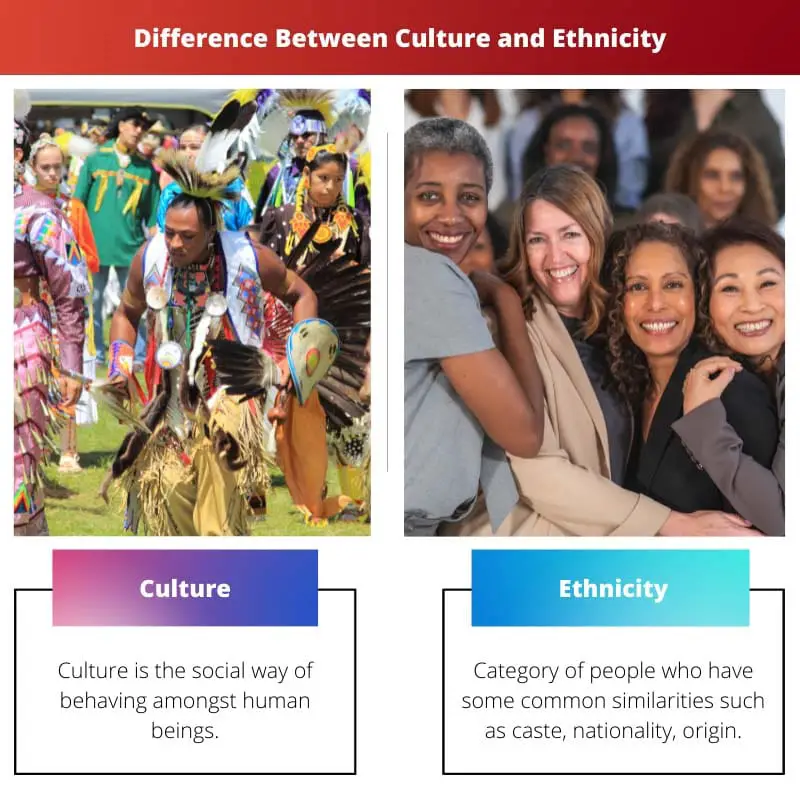Culture refers to the shared beliefs, behaviors, and customs of a particular group, often shaped by factors such as language, religion, and traditions. Ethnicity, on the other hand, pertains to one’s identification with a particular social group based on common ancestry, heritage, or nationality. While culture encompasses a broader spectrum of practices and values, ethnicity primarily focuses on a shared sense of belonging and identity rooted in common origins.
Key Takeaways
- Culture encompasses shared values, beliefs, customs, and practices of a group; ethnicity relates to people with a common ancestry or cultural heritage.
- Culture can change and evolve due to various factors; ethnicity remains relatively stable as it’s tied to heritage and ancestry.
- People from different ethnicities can share a common culture, and individuals from the same ethnicity can have diverse cultural backgrounds.
Culture vs Ethnicity
Culture refers to the shared beliefs, customs, practices, and social behavior of a particular group or society. Ethnicity refers to a group of people who identify with each other based on common ancestral, social, cultural, or national experiences, including shared language or dialect.

However, the above is not the only difference. A comparison between both the terms on specific parameters can shed light on subtle aspects:
Comparison Table
| Feature | Culture | Ethnicity |
|---|---|---|
| Definition | The shared beliefs, values, customs, behaviors, and practices of a particular group of people. | Shared heritage, ancestry, history, and social experience that connects a group of people. |
| Focus | Learned and transmitted behaviors, practices, and ideas. | Shared sense of identity based on common origins. |
| Elements | Language, religion, art, music, food, social norms, holidays, traditions. | Ancestry, language (sometimes), national origin, customs, religion (sometimes). |
| Fluidity | Cultures can change and adapt over time, borrowing from other cultures. | Ethnicity is more stable, but can evolve as groups mix and integrate. |
| Examples | American culture, Japanese culture, Hip Hop culture | Latino ethnicity, African American ethnicity, Irish ethnicity |
| Relationship | Ethnicity can be a foundation for culture, but culture is not limited to ethnicity. People from different ethnicities can share a culture. |
What is Culture?
Definition of Culture
Culture encompasses the shared beliefs, behaviors, values, and symbols that are characteristic of a particular group or society. It is the lens through which individuals perceive the world and interact with one another. Culture is not static but dynamic, evolving over time through interactions, exchanges, and influences from various sources.
Components of Culture
1. Language and Communication
Language serves as a cornerstone of culture, facilitating communication and the transmission of knowledge, beliefs, and traditions from one generation to another. Different languages reflect unique cultural nuances and perspectives, shaping the way individuals express themselves and understand the world around them.
2. Social Norms and Customs
Social norms dictate acceptable behaviors within a society, guiding interactions and relationships between individuals. Customs encompass rituals, ceremonies, and traditions that are integral to cultural identity, often reinforcing social cohesion and providing a sense of belonging within the community.
3. Religion and Belief Systems
Religion plays a significant role in shaping cultural values, moral principles, and worldviews. It influences societal norms, ethical codes, and practices, providing individuals with a framework for understanding existential questions and navigating life’s complexities.
4. Arts, Literature, and Expression
Artistic expressions, including literature, music, visual arts, and performing arts, reflect the creativity and cultural identity of a society. They serve as vehicles for storytelling, self-expression, and cultural preservation, conveying shared narratives, aesthetics, and values across generations.
5. Cuisine and Culinary Traditions
Food is not merely sustenance but also a reflection of cultural identity and heritage. Culinary traditions encompass recipes, cooking techniques, and dietary practices that are passed down through generations, embodying regional flavors, historical influences, and social gatherings.
6. Material Culture and Technology
Material culture encompasses the tangible artifacts, tools, and technologies produced by a society, reflecting its values, priorities, and technological advancements. From architecture and clothing to transportation and consumer goods, material culture shapes daily life and contributes to cultural identity.
Cultural Diversity and Globalization
In an increasingly interconnected world, cultures interact and converge, leading to cultural hybridization and globalization. While globalization facilitates the exchange of ideas, goods, and cultural practices, it also raises concerns about cultural homogenization and the erosion of traditional identities. Embracing cultural diversity and fostering intercultural dialogue is essential for promoting mutual understanding, respect, and harmony in a multicultural world.

What is Ethnicity?
Definition of Ethnicity
Ethnicity refers to the shared cultural, linguistic, religious, or ancestral characteristics that define a particular group of people. It encompasses a sense of belonging and identity rooted in common heritage, history, and experiences. Ethnicity is often self-identified and can be a significant factor in shaping individual and group identities within larger societies.
Components of Ethnicity
1. Ancestral Heritage
Ancestral heritage forms the foundation of ethnicity, linking individuals to their forebears and the historical narratives of their community. Shared ancestry often includes common genetic traits, familial lineages, and historical migrations that contribute to a collective sense of belonging and identity.
2. Cultural Practices and Traditions
Cultural practices and traditions play a central role in defining ethnic identity, encompassing language, customs, rituals, and celebrations that are passed down through generations. These cultural elements serve as markers of ethnic identity, reinforcing social bonds and preserving cultural heritage within ethnic communities.
3. Language and Communication
Language serves as a key identifier of ethnicity, with distinct linguistic characteristics often associated with specific ethnic groups. Language not only facilitates communication within ethnic communities but also serves as a symbol of cultural identity and heritage, shaping the way individuals perceive themselves and others.
4. Religious Affiliation
Religious affiliation is closely intertwined with ethnicity, as shared religious beliefs and practices often contribute to a sense of cultural solidarity and identity within ethnic groups. Religious institutions play a significant role in preserving cultural traditions, fostering social cohesion, and transmitting values across generations.
5. Territorial and Political Boundaries
Territorial and political boundaries can also influence ethnic identity, particularly in regions where ethnic groups are concentrated within specific geographic areas or political entities. Historical interactions, conflicts, and colonial legacies may shape ethnic boundaries and influence group identities within multiethnic societies.
Ethnic Diversity and Identity Formation
Ethnicity is characterized by diversity and fluidity, as individuals may identify with multiple ethnicities or undergo shifts in ethnic identity over time. Factors such as intermarriage, migration, urbanization, and globalization contribute to the complexity of ethnic identity formation, leading to the emergence of hybrid identities and multicultural societies.
Challenges and Opportunities
While ethnicity provides a sense of belonging and cultural continuity for many individuals, it can also be a source of social division, discrimination, and conflict, particularly in contexts where ethnic differences are politicized or marginalized. Promoting cultural diversity, fostering interethnic dialogue, and addressing systemic inequalities are essential for building inclusive societies that respect and celebrate ethnic identities.

Main Differences Between Culture and Ethnicity
- Scope:
- Culture encompasses a broad range of shared beliefs, behaviors, customs, values, and symbols within a society or group.
- Ethnicity refers specifically to shared cultural, linguistic, religious, or ancestral characteristics that define a particular group of people.
- Components:
- Culture includes elements such as language, social norms, religion, arts, cuisine, and material culture.
- Ethnicity comprises components like ancestral heritage, cultural practices, language, religious affiliation, and territorial boundaries.
- Identification and Belonging:
- Culture shapes the way individuals perceive the world and interact with others within a broader societal context.
- Ethnicity provides a sense of belonging and identity rooted in shared heritage, history, and experiences within a specific ethnic group or community.
- Fluidity and Diversity:
- Culture can vary widely within a single ethnic group and may change over time due to influences from globalization, migration, and cultural exchange.
- Ethnicity can be fluid and may encompass multiple identities, but it often retains a strong connection to ancestral heritage and cultural traditions.
- Interaction with Society:
- Culture influences social norms, values, and behaviors, shaping interactions and relationships within societies.
- Ethnicity can play a role in social dynamics, particularly in multiethnic societies, affecting issues such as identity politics, discrimination, and intergroup relations.


The article is lacking in its exploration of the dynamic nature of culture and ethnicity. It falls short in capturing the fluidity that exists within these contexts.
I respectfully disagree. The article adeptly addresses the changing nature of culture and the stability of ethnicity. It provides a comprehensive understanding of both concepts.
With due respect, I believe the article effectively conveys the evolving nature of culture and the enduring qualities of ethnicity. It’s a compelling analysis of the subject matter.
The article offers a comprehensive and discerning comparison between culture and ethnicity, enhancing the reader’s knowledge on these subjects.
I concur with your assessment. The article is a significant contribution to the discourse on culture and ethnicity, offering a detailed and articulate analysis.
The author has done an exceptional job in highlighting the nuances between culture and ethnicity. It’s a valuable resource for those seeking to comprehend the intricacies of social identification.
I found the detailed comparison table to be particularly helpful in distinguishing between culture and ethnicity. It brings clarity to an misconstrued topic.
The article elucidates the subject matter with precision and clarity. It’s evident that extensive research has been undertaken to produce such well-articulated content.
This article is an excellent overview of the difference between culture and ethnicity. It provides a thorough explanation of the two concepts and their significance in society. Well done!
I appreciate the depth of knowledge shared in this article. It has certainly enriched my understanding of culture and ethnicity. A well-researched and articulate piece.
I couldn’t agree more, Naomi. The article is very informative and provides a detailed analysis of culture and ethnicity. It’s an essential read for anyone interested in social sciences.
The article provides an insightful examination of culture and ethnicity, offering clarity and depth in understanding these intricate social phenomena.
The depth of analysis in the article is commendable, shedding light on the multifaceted nature of culture and ethnicity.
The article is a commendable scholarly endeavor, unraveling the complexities of culture and ethnicity with intellectual acumen.
The author provides a comprehensive and elucidative exploration of culture and ethnicity, shedding light on their divergence and interrelation.
Absolutely, the article delves into the complexities of culture and ethnicity with depth and discernment. It’s a commendable scholarly contribution.
The depth of insight in the article is impressive, offering a scholarly perspective on culture and ethnicity. It’s an indispensable resource for those engaged in social analysis.
The article serves as a comprehensive guide to understanding culture and ethnicity. The lucidity of the content is commendable and makes it an enriching read.
The information presented is thought-provoking and insightful. It has broadened my perspective on the subject and encouraged me to explore further.
The article offers a profound and scholarly exploration of culture and ethnicity, enriching the reader’s comprehension of these subjects.
I wholeheartedly agree with your assessment. The article is a significant scholarly contribution, fostering an informed understanding of culture and ethnicity.
The article is a commendable scholarly endeavor, unraveling the complexities of culture and ethnicity with intellectual acumen.
The delineation between culture and ethnicity is conveyed succinctly and persuasively. It’s a commendable effort to expound on these intricate topics.